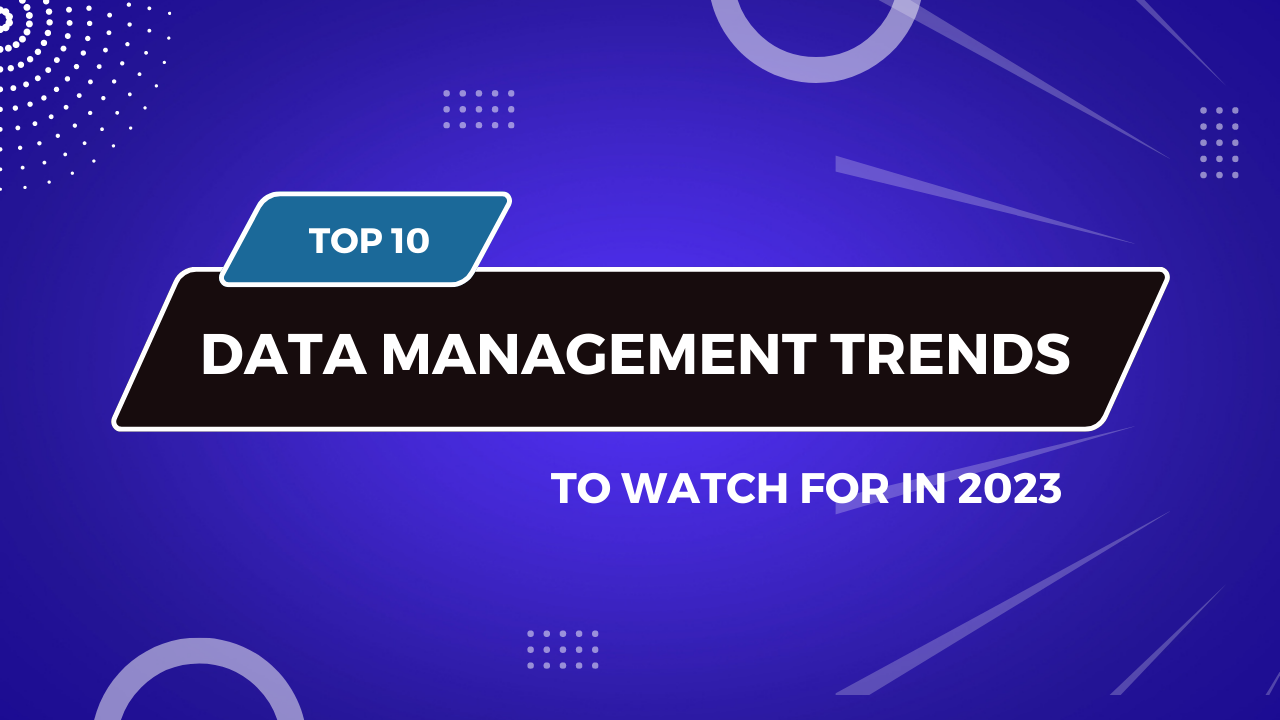Enterprises from various industries are going through digital transformation and, in the process creating vast amounts of data. Hence, it becomes essential to do optimization of the data management processes and make them cost-effective. At the same time, big data and analytics let businesses use their organizational data to make data-driven decisions and improve results. In this blog, you will go through the top 10 data management trends and innovations in 2023 to familiarize you with emerging data management solutions. These solutions range from hybrid clouds and AI to blockchain and novel DataOps solutions. Please continue reading to know how they impact your business.
1. Advanced-Data Analytics
There is enterprises with large amounts of data assets that see beyond traditional business intelligence (BI) to resolve complicated business problems. They utilize advanced data analytics solutions like augmented analytics, B2B analytics tools, and cloud analytics. Solutions like these allow organizations to get more value from the data and fit into data-driven decision-making workflows. We have many Start-ups that build data analytics solutions through either descriptive, diagnostic, or predictive analytics based on application scenarios.
2. Artificial Intelligence
Today organizations are producing vast amounts of data, and it has become very challenging to structure and clean this vast amount manually. To automate the management and cleaning of unstructured data, we use AI and machine learning algorithms. AI is integrated at different levels of data capture for automating the complete data management lifecycle, from ingestion to curation & structuring.
3. Data Fabric
Data fabric is an architecture that facilitates integrating end-to-end data management capabilities while at the same time being independent of data environments, usage, and procedures. By automated discovery & governance of data by data fabrics, businesses can leverage data across value chains. Therefore, this approach helps eliminate organizational data silos and supports inter-team or inter-plant associations.
4. Hybrid Cloud
Enterprises these days utilize on-premise installations along with public and private clouds for different data services. Therefore, their management becomes complex as different components have different levels of privacy requirements. Businesses benefit from greater flexibility by adopting a hybrid cloud strategy – on-premises functions like the public cloud. Still, at the same time, it has an extra layer of data security. With the help of hybrid cloud solutions, businesses can move business-critical data and workloads to public cloud environments while keeping sensitive data on-premise.
5. Blockchain
Enterprises need to take the help of third-party over their data management solutions to eliminate cyber-attack risks and ensure data compliance. But then, blockchain-powered data storage solutions do away with the need for such security solutions. It has distributed ledger technology that allows companies to generate assets, audit trails, and transaction records with better security. Besides this, blockchain’s dispersed data storage reduces the chances of data tampering to a large extent, increasing authenticity and accuracy.
Improve the Communication, Integration & Automation of data flow across your Organization
Calculate your DataOps ROI
6. Metadata Management
If you manually manage the metadata of vast amounts of data created in organizational processes, it may take a lot of time & resources. This, in turn, lowers the database queries and data analytics performance. Automated metadata management tools collect extra data in near real-time, removing inconsistencies and eliminating data silos. This ensures superior data quality and gives a boost to analytics workflows.
7. Data Marketplaces
If organizations make data-driven business decisions, it benefits the organizations as there are operational improvements and sales opportunities. But then, they need to access large organizational and customer data datasets to wield analytics workflows. For improving data access, start-ups give data marketplaces wherein organizations can monetize and get access to highly relevant data. This gives the organizations diverse data sources and alleviates in-house data collection. By using such public and private-sourced data, they can increase analytics model performance, advance risk management, and create new leads.
8. Data Governance & Compliance
Data fed from different organizational pipelines is not quality and may lead to conflicting information, copies, blank fields, and other common data errors. Organizations bring together data governance strategies for the entire data lifecycles to tackle these issues. Furthermore, the government authorities bring regulations to ensure that sensitive customer data is safe. This is why data compliance management solutions are gathering interest in the data management field.
9. IoT Data Management
Today we have many connected devices in the industrial and commercial sectors, forcing companies to use data management systems made for IoT devices. This way, organizations can separate other business data for essential workflows and prepare database queries for IoT data whenever needed. In addition, IoT deployments have different use cases, and that makes IoT data management even more complicated.
10. DataOps
The IT teams control the data, and the business data, which is used to develop solutions and generate insights, is spread across organizational hierarchies. Because of this, there is sometimes a delay in data project deliveries, significantly impacting the employees’ productivity. DataOps, on the other hand, brings together business processes & data technologies to enhance data access throughout the organizations and accelerate analytics workflows. Thus, all stakeholders can quickly access data on demand, and companies can enhance data performance to ensure better data insights, & drive sales.
ISmile Technologies DataOps managed services optimize your data to be trust-worthy & business ready. Our scalable solutions help businesses accelerate their journey to AI-powered automation & improve data quality & real-time data governance to enable the far-reaching business potential of AI/ML. Schedule a free assessment today.








